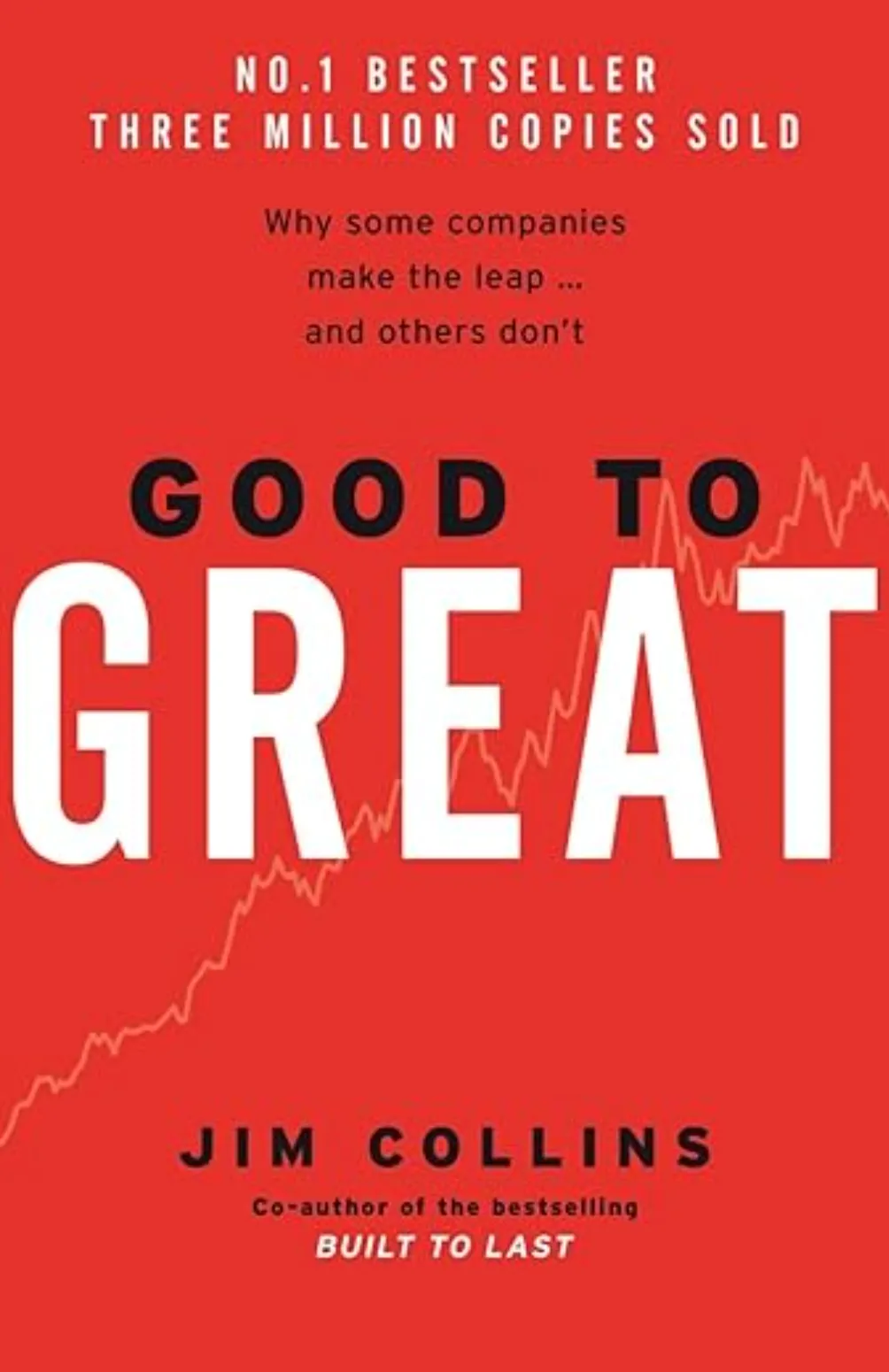

The WordScotts Newsletter #3
November 1, 2024
Contents Of This Month's Issue
1. How Professional Service Firms Can Become THE Trusted Authority In The Market(s) They Serve [each firm type below is a link]:

2. AI Developments in October [link]
3. Tool or Resource Recommendation for November [link]
4. The Word That Matters for November [link]
5. November Recommendation for Scaling Your Business [link]
6. November Book of the Month Recommendation [link]
7. Special November Offer For Other WordScott Services [link]
8. The WordScott Referral Program for November [link]
9. Please Consider Sharing This Newsletter [link]
1. How Professional Service Firms Can Become THE Trusted Authority In The Market(s) They Serve
Accountants
To position your accounting firm as THE Trusted Authority in the market(s) you serve, every element of your newsletter should reinforce credibility, expertise, and approachability.
This framework breaks down nine strategic approaches to help you establish authority effectively—from sharing valuable insights and offering client-focused educational content to showcasing social proof and building personal connections.
Each section includes a "What to Include," an "Example," and an explanation of "Why It Positions You as THE Trusted Authority," ensuring you deliver not only relevant information but also a powerful, consistent message that sets you apart.
Use this guide to make your newsletter a go-to resource, helping clients see your firm as the trusted partner they can rely on for expertise, guidance, and impactful results.

Read More
1. Provide Valuable, Insight-Driven Content
What to Include: Industry insights, regulatory updates, and commentary on current trends impacting clients, like tax law changes or economic forecasts.
Example: “What New Tax Regulations Mean for Your Business in 2024” – a breakdown of recent changes with specific examples on how these might impact different client sectors.
Why It Positions You as THE Trusted Authority: By providing timely, relevant information and your expert analysis, clients see you as not just a service provider but as a thought leader who’s keeping them informed and prepared for change.
2. Create a Signature Series or Exclusive Insights
What to Include: A monthly column, written by a senior accountant, that dives deep into complex accounting topics with practical advice.
Example: “From the Partner’s Desk: Strategies for Maximizing Cash Flow During Economic Uncertainty.”
Why It Positions You as THE Trusted Authority: A regular column by a seasoned professional creates consistency and builds a trusted voice, allowing clients to see your expertise as dependable and deep-rooted.
3. Use Case Studies and Client Success Stories
What to Include: Real-world examples of how your firm solved a complex client issue, including the challenges, solutions, and outcomes.
Example: “How We Helped a Client Reduce Tax Liability by 25%” – anonymized details of a successful strategy that demonstrates your expertise in tax planning.
Why It Positions You as THE Trusted Authority: By sharing case studies, you’re showing that your advice isn’t theoretical—it’s grounded in successful, real-world application. This proves your capability and reassures clients that you’re experienced in solving their challenges.
4. Share Practical Advice and Actionable Tips
What to Include: Seasonal tax preparation tips, financial planning guides, and small business advice that clients can implement right away.
Example: “5 Tax Deductions to Maximize This Year-End” – a checklist-style guide with actionable steps.
Why It Positions You as THE Trusted Authority: By offering immediate, actionable advice, you establish yourself as a reliable resource that clients can turn to for solutions, reinforcing your role as a proactive partner.
5. Feature Industry Benchmarks and Original Research
What to Include: Data from client surveys, industry benchmarks, or unique insights gathered from your work with various clients (without disclosing specifics).
Example: “2024 Business Trends: How Your Financial Health Measures Up” – a report on how businesses in different industries are performing, based on data you’ve collected.
Why It Positions You as THE Trusted Authority: Providing unique, data-driven insights gives your firm an authoritative edge, positioning you as a valuable resource for industry benchmarks that help clients assess their own progress.
6. Introduce an Educational Component with Webinars or Workshops
What to Include: Invitations to free or discounted webinars on relevant accounting topics, led by your firm’s experts.
Example: “Upcoming Webinar: Understanding Tax Changes for 2024” – a session where clients can learn about updates and ask questions in real time.
Why It Positions You as THE Trusted Authority: Offering exclusive, expert-led learning opportunities shows that you’re committed to educating your clients, not just selling to them. This creates loyalty and trust as clients see you as an accessible expert.
7. Incorporate Social Proof and Testimonials
What to Include: Quotes from satisfied clients, testimonials highlighting your team’s expertise, and any awards or recognitions your firm has earned.
Example: “What Our Clients Are Saying: ‘[Firm Name] has saved us thousands in tax liability with strategies we hadn’t considered’” – a testimonial that highlights your expertise.
Why It Positions You as THE Trusted Authority: Social proof is incredibly persuasive; when clients see that others trust you, it reinforces your credibility. Testimonials showcase your track record of success and instill confidence in your capabilities.
8. Build Personal Connections with a “Message from the Partner”
What to Include: A short, introductory message from a partner that sets the tone for each newsletter, sharing personal insights on what’s top-of-mind for the firm.
Example: “A Message from Our Partner, [Name]: Why Cash Flow Management is Critical Right Now.”
Why It Positions You as THE Trusted Authority: A personal note from leadership adds warmth and accessibility, helping clients feel connected to your firm and giving them insight into the principles guiding your expertise.
9. Encourage Interactivity to Build Engagement
What to Include: A call for reader questions, a short poll on their current challenges, or a feedback form about newsletter topics they find most useful.
Example: “Tell Us: What Accounting Challenges Are You Facing This Quarter?” – a prompt for clients to submit questions or topics.
Why It Positions You as THE Trusted Authority: Actively seeking client feedback shows that you value their needs and are responsive to them. This two-way interaction strengthens trust, as clients see you as a partner interested in solving their specific challenges.
Each of these elements contributes to positioning your accounting firm as the definitive authority. By combining thought leadership, practical advice, unique insights, and personal connections, your newsletter can go beyond mere updates to become an indispensable resource for your clients.
Business Advisors
In this article, we explore effective strategies for positioning your Business Advisory firm as THE Trusted Authority through a well-curated newsletter.
By focusing on valuable insights, client-centered advice, and engagement opportunities, your firm can establish itself as an essential resource for clients.
Strategies include providing economic and industry analysis, offering strategic planning guidance, and sharing success stories that highlight real client achievements.
Incorporating benchmarking data, hosting webinars, and adding a "Partner's Perspective" create an authoritative voice, while interactive elements like polls and personalized recommendations build rapport and responsiveness.
This approach not only showcases expertise but also fosters a connection with clients, reinforcing your role as their trusted advisor.

Read More
1. Share Market Insights and Economic Analysis
What to Include: Current trends, economic forecasts, ad industry analysis that impact business decisions. Cover topics like financial projections, regulatory updates, or industry-specific opportunities.
Example: “How Upcoming Economic Shifts Could Impact Small Business Growth in 2024” – a detailed breakdown of projected economic changes with actionable advice for businesses.
Why It Positions You as THE Trusted Authority: By offering insights on the broader economic landscape, you demonstrate that you’re well-informed and proactive, helping clients make strategic decisions that could significantly impact their business success.
2. Provide Strategic Business Planning Tips
What to Include: Step-by-step guides and best practices for long-term business planning, such as budgeting, forecasting, and risk management.
Example: “5 Essential Steps for Creating a Resilient 5-Year Business Plan” – practical advice on setting achievable goals, aligning resources, and preparing for market changes.
Why It Positions You as THE Trusted Authority: Practical, actionable advice shows that you understand the complexities of business planning and have the expertise to guide clients through essential processes. This positions your firm as a strategic partner in their long-term growth.
3. Use Client Case Studies and Success Stories
What to Include: Success stories that illustrate how your advice helped clients overcome challenges or achieve key objectives. Include specifics on the problem, your solution, and measurable results.
Example: “How Our Advisory Helped a Manufacturing Client Increase Profit Margins by 20%” – a case study showing the strategies implemented and the impact on the client’s business.
Why It Positions You as THE Trusted Authority: Sharing client success stories not only validates your expertise but also gives prospective clients confidence in your ability to deliver real results, which reinforces trust.
4. Offer Industry Benchmarks and Competitive Analysis
What to Include: Industry benchmark data and competitive analysis to help clients gauge their position in the market. This could include performance metrics, growth rates, and operational benchmarks.
Example: “Where Does Your Business Stand? Benchmarking Your Financial Health Against Industry Averages” – a comparison that helps clients identify areas for improvement.
Why It Positions You as THE Trusted Authority: Providing benchmarking data shows that you understand the competitive landscape and can help clients identify both their strengths and areas for improvement, positioning you as an expert in helping them achieve market leadership.
5. Host Webinars and Interactive Q&A Sessions
What to Include: Invitations to live or recorded webinars on relevant topics, such as “Building Resilience in a Changing Market” or “Preparing for Regulatory Shifts.”
Example: “Join Our Upcoming Webinar: Strategies for Strengthening Your Business in Uncertain Times” – a session that offers clients real-time insights and the chance to ask questions.
Why It Positions You as THE Trusted Authority: Webinars allow you to showcase your expertise in a direct, interactive way, enabling clients to engage with you in real time. This builds trust and reinforces your position as an accessible, knowledgeable resource.
6. Include Personalized Recommendations and Strategic Advice
What to Include: Customized recommendations based on different client scenarios or market conditions. Offer tips that apply to specific industries or business sizes.
Example: “What Small Businesses in Retail Need to Know About 2024 Tax Changes” – focused advice that’s directly relevant to a specific client segment.
Why It Positions You as THE Trusted Authority: Tailored advice shows that you’re not just offering generic content but are invested in the success of specific client groups. This helps clients see you as a true partner who understands their unique challenges.
7. Share Testimonials and Social Proof
What to Include: Testimonials from satisfied clients who have benefited from your services, as well as any awards or recognitions your firm has received.
Example: “Our Clients Say It Best: ‘[Firm Name] provided the strategic insights we needed to double our revenue this year’” – a testimonial that speaks to the impact of your services.
Why It Positions You as THE Trusted Authority: Testimonials serve as powerful social proof, reinforcing the trust clients have in your firm and showing that you consistently deliver on your promises.
8. Provide a “Partner’s Perspective” Section
What to Include: A brief message or article from a senior advisor, discussing current business challenges or trends and offering insights based on years of experience.
Example: “From the Advisor’s Desk: Navigating Uncertainty with Confidence” – a personal note addressing current market conditions and sharing the partner’s advice for steady growth.
Why It Positions You as THE Trusted Authority: A regular “Partner’s Perspective” section creates a connection with clients and showcases the expertise of your firm’s leadership. It reinforces the idea that your team is composed of seasoned professionals with valuable insights.
9. Encourage Client Engagement Through Polls and Surveys
What to Include: Brief surveys or polls to gauge client challenges, needs, or interests. This could include questions about their biggest concerns or topics they’d like covered in future newsletters.
Example: “Tell Us What You Need: What’s Your Biggest Challenge This Quarter?” – a poll or survey that invites clients to share their perspectives.
Why It Positions You as THE Trusted Authority: Engaging clients directly shows that you’re responsive and attentive to their needs. By actively seeking feedback, you demonstrate that you’re committed to providing value and tailoring your services to client interests.
This structured approach makes your Business Advisory newsletter a powerful tool for establishing your firm as THE trusted authority. By delivering a mix of strategic insights, client-focused advice, and interactive elements, you position your firm as a knowledgeable, reliable, and indispensable partner for clients’ business success.
Estate Planners
To establish your Estate Planning firm as THE Trusted Authority in the market(s) you service, your newsletter can serve as a powerful tool for
building credibility, providing value, and fostering client loyalty.
By sharing actionable insights, personalized advice, and client success stories, you position your firm as an indispensable resource for clients’ estate planning needs.
This guide offers strategies to create engaging and authoritative content, from legislative updates and strategic planning tips to interactive webinars and client testimonials.
These elements not only highlight your expertise but also create a deeper, more connected relationship with your clients, reinforcing your firm’s role as a reliable, knowledgeable partner in their estate planning journey.

Read More
To establish your Estate Planning firm as THE Trusted Authority through a newsletter, focus on providing content that builds trust, showcases your expertise, and delivers real value to your clients. Below are some effective strategies that can help position your firm as an indispensable resource for estate planning.
1. Share Legislative and Regulatory Updates
What to Include: Relevant changes in estate tax laws, inheritance regulations, and updates on legal requirements impacting estate planning. This can include details on wills, trusts, and probate laws.
Example: "New Estate Tax Thresholds for 2024: What It Means for Your Family’s Wealth" – an article explaining how recent changes to estate tax thresholds impact inheritance planning.
Why It Positions You as THE Trusted Authority: By staying on top of legislative changes and explaining their implications, you demonstrate that your firm is informed, proactive, and committed to keeping clients ahead of important regulatory shifts. This positions your firm as a knowledgeable advisor who is always looking out for clients’ best interests.
2. Offer Practical Estate Planning Tips
What to Include: Actionable tips for structuring wills, managing trusts, and protecting assets that clients can implement immediately to strengthen their estate plans.
Example: "5 Essential Steps to Strengthen Your Estate Plan This Year" – a checklist that covers key actions like updating beneficiary designations and reviewing guardianship plans.
Why It Positions You as THE Trusted Authority: By providing clients with useful, practical advice, you position yourself as a hands-on advisor who can simplify complex estate planning decisions. This proactive support reassures clients that your firm is invested in their long-term security.
3. Highlight Client Success Stories (Anonymized)
What to Include: Case studies that illustrate how your firm helped clients achieve specific estate planning goals, such as minimizing taxes, ensuring smooth asset transfer, or creating a legacy.
Example: "How We Helped a Family Reduce Estate Taxes by 30% Through Trust-Based Planning" – a case study that showcases how your strategies resulted in tangible benefits for a client.
Why It Positions You as THE Trusted Authority: Real-world examples of successful planning show that your advice isn’t theoretical—it’s grounded in proven results. Sharing these successes builds credibility and confidence in your ability to deliver impactful, tailored estate planning solutions.
4. Provide Wealth Transfer and Legacy Planning Advice
What to Include: Guidance on creating trusts, charitable donations, and setting up legacy plans that reflect clients’ values and intentions for wealth transfer.
Example: "How to Establish a Charitable Trust to Benefit Your Family and the Causes You Care About" – an article explaining the benefits and steps of setting up a charitable trust.
Why It Positions You as THE Trusted Authority: By offering strategies that go beyond simple asset distribution, you show that you understand clients’ deeper goals. This expertise in legacy planning reinforces your role as a thoughtful advisor who helps clients leave a meaningful legacy.
5. Feature Personalized Planning Scenarios
What to Include: Scenarios that address specific client needs, such as planning for blended families, managing international assets, or protecting special needs dependents.
Example: "Estate Planning for Blended Families: 3 Scenarios to Consider" – a breakdown of considerations for creating balanced estate plans that respect all family members’ interests.
Why It Positions You as THE Trusted Authority: Personalized advice shows that you understand the diverse situations clients may face. This approach makes clients feel seen and supported, establishing your firm as a resource for personalized, client-centered estate planning solutions.
6. Publish Educational Articles on Estate Planning Basics
What to Include: Clear, informative articles that break down estate planning fundamentals, like the purpose of a will, the role of an executor, and the differences between various trusts.
Example: "Understanding the Role of an Executor: What to Know Before Choosing" – an article that explains the executor’s responsibilities and factors to consider when making this choice.
Why It Positions You as THE Trusted Authority: Educating clients on the basics builds their confidence and trust in your expertise. By making estate planning accessible, you become a trusted source of knowledge that clients can rely on.
7. Provide Industry Benchmarks and Estate Planning Trends
What to Include: Data and insights on estate planning trends, like average inheritance sizes, popular trust types, or demographic trends in legacy planning.
Example: "2024 Estate Planning Trends: How Families Are Protecting Their Wealth" – a report detailing how different demographics approach estate planning, including statistics and client preferences.
Why It Positions You as THE Trusted Authority: Sharing industry data shows that you understand the broader landscape of estate planning. This insight into trends establishes your firm as a thought leader who can offer clients the latest and most relevant information.
8. Host Webinars on Estate Planning Topics
What to Include: Invitations to webinars on topics like "Updating Your Estate Plan After Major Life Changes" or "How to Maximize the Impact of Your Trust."
Example: "Upcoming Webinar: Estate Planning Essentials for High-Net-Worth Families" – a live event that offers in-depth knowledge and Q&A time with an estate planning expert.
Why It Positions You as THE Trusted Authority: Webinars create a platform for direct client engagement and education, allowing clients to interact with you in real-time. This establishes your firm as an accessible, expert resource and reinforces client trust.
9. Include Client Testimonials and Social Proof
What to Include: Quotes from clients who have benefited from your services, awards or recognitions, and professional memberships in estate planning associations.
Example: "Our Clients Say It Best: '[Firm Name] gave us the peace of mind we needed to plan for our family’s future’" – a testimonial that highlights your firm’s impact.
Why It Positions You as THE Trusted Authority: Testimonials offer social proof, showing that other clients trust and value your expertise. This validation builds credibility and reassures potential clients of your ability to meet their needs.
10. Add a “Message from the Partner” Section
What to Include: A brief message from a senior advisor or partner sharing thoughts on recent developments or current estate planning priorities.
Example: "From Our Partner: Why Estate Planning Is More Important Now Than Ever" – a personal note offering insights on the importance of estate planning in light of recent regulatory changes.
Why It Positions You as THE Trusted Authority: A personal message from leadership adds warmth and insight, making clients feel more connected to your firm. This also reinforces the experience and commitment of your leadership team, building trust in their expertise.
11. Encourage Client Engagement Through Polls or Feedback
What to Include: Polls or surveys on estate planning concerns or topics clients want to learn more about, which help you tailor future content to their interests.
Example: "What Are Your Top Estate Planning Concerns for 2024?" – a quick survey that helps clients share their priorities and concerns.
Why It Positions You as THE Trusted Authority: By inviting feedback, you show that you’re attentive to client needs and eager to address their concerns. This interactive approach strengthens client trust, as they see your firm as responsive and client-focused.
By implementing these strategies, your Estate Planning firm can craft a newsletter that not only provides value but also reinforces your role as THE Trusted Authority. This client-centered approach builds long-term relationships, keeps clients informed, and positions your firm as a go-to resource for all their estate planning needs.
Financial Planners
To establish your Financial Planning firm as THE Trusted Authority, a well-crafted newsletter can be a powerful tool for building credibility and client loyalty.
By sharing relevant market insights, providing actionable financial advice, and fostering client engagement, you position your firm as an essential resource in clients’ financial journeys.
This guide offers strategies to elevate your newsletter, including timely
economic analysis, case studies, personalized financial planning tips, and
interactive elements.
These components not only showcase your expertise but also reinforce your role as a dedicated, knowledgeable advisor committed to guiding clients toward financial success.

Read More
To establish your Financial Planning firm as THE Trusted Authority through a newsletter, focus on providing insightful, client-centered content that builds trust and showcases your expertise. Here are some effective strategies:
1. Share Economic and Financial Market Insights
What to Include: Timely updates on economic trends, market shifts, interest rates, and inflation that could impact clients' financial decisions.
Example: "Market Watch: How Rising Interest Rates Could Affect Your Investment Strategy in 2024" – an article analyzing the effects of rising rates on different investment options.
Why It Positions You as THE Trusted Authority: By providing relevant market insights, you demonstrate that you’re proactive, well-informed, and prepared to guide clients through changing economic landscapes, making you a reliable source for strategic financial advice.
2. Provide Personalized Financial Planning Tips
What to Include: Actionable guidance on budgeting, saving, retirement planning, and tax strategies, tailored to specific client demographics like retirees, young professionals, or small business owners.
Example: "Top 5 Financial Strategies for New Families: Saving for College and Managing Debt" – a targeted list of steps young families can take to start planning for major life goals.
Why It Positions You as THE Trusted Authority: Offering practical, relatable advice positions you as a financial partner who understands unique client needs and can provide relevant, effective solutions to achieve their goals.
3. Include Client Success Stories
What to Include: Case studies highlighting clients who have achieved significant financial goals with your guidance, focusing on challenges faced, solutions provided, and the positive outcomes.
Example: "How We Helped a Client Increase Their Retirement Savings by 30% in Two Years" – a story that illustrates a successful retirement plan tailored to the client’s lifestyle.
Why It Positions You as THE Trusted Authority: Real-world success stories validate your expertise and give clients confidence in your ability to help them reach their financial objectives, reinforcing trust in your services.
4. Offer Tax Planning and Year-End Tips
What to Include: Advice on optimizing taxes, maximizing deductions, and minimizing liabilities, especially toward year-end, to help clients make the most of tax-saving opportunities.
Example: "Year-End Tax Strategies: 7 Ways to Lower Your Tax Bill Before December 31" – a checklist to guide clients through essential tax-saving steps.
Why It Positions You as THE Trusted Authority: By delivering timely tax advice, you show clients that you’re dedicated to proactive, holistic financial planning, which helps build trust and positions you as an attentive advisor.
5. Feature Industry Benchmarks and Financial Trends
What to Include: Benchmarks and trends related to savings rates, investment returns, and financial behaviors that help clients gauge their financial health against industry standards.
Example: "2024 Financial Health Check: How Does Your Savings Rate Compare?" – an article comparing average savings and debt ratios to provide clients with perspective on their financial standing.
Why It Positions You as THE Trusted Authority: Providing benchmarking data shows that you understand the financial landscape and can help clients assess their progress, reinforcing your expertise and your role as a valuable guide.
6. Host Educational Webinars on Key Financial Topics
What to Include: Invitations to webinars that cover high-interest topics such as “Investment Strategies in Volatile Markets” or “Maximizing Your Retirement Savings.”
Example: "Join Us for Our Webinar: Financial Strategies to Navigate Uncertain Times" – an interactive session where clients can learn directly from your firm’s experts.
Why It Positions You as THE Trusted Authority: Webinars create an interactive platform for clients to learn and engage with your team, reinforcing your expertise and commitment to client education, which builds trust and loyalty.
7. Provide Retirement Planning Insights
What to Include: Comprehensive articles covering essential retirement topics like 401(k) strategies, Social Security optimization, and income planning.
Example: "Is Your Retirement on Track? Key Milestones to Hit at Every Age" – a guide that offers tailored advice based on different life stages.
Why It Positions You as THE Trusted Authority: By helping clients prepare for retirement in a structured, strategic way, you position your firm as a go-to resource for long-term financial security and planning.
8. Share Testimonials and Social Proof
What to Include: Client testimonials, success stories, and any awards or recognitions that validate your credibility and expertise in financial planning.
Example: "Our Clients Say It Best: '[Firm Name] helped us develop a strategy that doubled our investment returns in two years’" – a testimonial highlighting impactful results.
Why It Positions You as THE Trusted Authority: Social proof builds credibility by showing clients that others trust you and have benefited from your advice, enhancing your firm’s reputation as a successful, trusted advisor.
9. Add a “Partner’s Perspective” Section
What to Include: A message from a senior advisor or partner addressing recent financial events, trends, or sharing personal insights on market dynamics and planning strategies.
Example: "From Our Founder: Why Financial Discipline Matters More Than Ever in Today’s Market" – a column from a partner that connects the firm’s leadership with clients.
Why It Positions You as THE Trusted Authority: Personal messages from leadership add warmth, authenticity, and expertise, showing clients that your team is composed of seasoned professionals committed to guiding them through all market conditions.
10. Offer a Financial Health Assessment Tool
What to Include: An interactive tool or self-assessment quiz that helps clients evaluate their financial health, like savings adequacy, debt management, and investment readiness.
Example: "Take Our Financial Wellness Quiz: See Where You Stand in 2024" – a tool for clients to identify areas of strength and improvement in their financial health.
Why It Positions You as THE Trusted Authority: Providing a tool that clients can use on their own shows that you’re committed to empowering them in their financial journey, making you a supportive and resourceful partner in their success.
11. Encourage Client Engagement with Polls and Q&A
What to Include: Polls, surveys, or a Q&A section where clients can share their financial concerns or request content on specific topics they’re interested in learning more about.
Example: "Tell Us: What Financial Topic Do You Want to Learn About Next?" – a short poll inviting clients to suggest future content.
Why It Positions You as THE Trusted Authority: Engaging clients directly shows that you’re responsive to their needs and interested in providing value. This two-way communication strengthens client relationships and reinforces your role as a dedicated, attentive advisor.
These strategies will help your Financial Planning firm create a newsletter that builds credibility, educates clients, and positions you as the trusted authority in your field. By sharing insights, offering personalized advice, and actively engaging with clients, your firm can establish itself as an indispensable resource for clients’ financial success.
HR Consultants
In today’s dynamic HR landscape, establishing your HR Consulting firm as THE Trusted Authority is essential for building client confidence and long-term relationships.
This guide outlines strategies for creating a compelling newsletter that demonstrates expertise, provides actionable insights, and fosters client engagement.
By sharing timely HR trends, success stories, leadership advice, and interactive elements like webinars and feedback opportunities, your newsletter can position your firm as an indispensable resource for HR professionals.
These strategies not only showcase your knowledge but also create a genuine connection with clients, reinforcing your firm’s role as a dedicated partner in their HR success.

Read More
To establish your HR Consulting firm as THE Trusted Authority, your newsletter should offer insightful, actionable, and client-focused content that addresses the pressing needs and challenges of HR professionals and businesses. Here are some key strategies to achieve this:
1. Share Insights on HR Trends and Compliance Updates
What to Include: Timely updates on HR trends, regulatory changes, and compliance requirements impacting businesses, such as labor laws, diversity mandates, and employee rights.
Example: "New Employee Rights Laws for 2024: What HR Managers Need to Know" – a summary of the latest regulations and practical steps for implementation.
Why It Positions You as THE Trusted Authority: Staying ahead of regulatory changes and industry trends shows your firm’s proactive approach to guiding clients through complex HR landscapes, establishing you as a valuable, informed resource.
2. Provide Talent Management and Retention Tips
What to Include: Actionable advice on recruiting, onboarding, training, and retaining top talent, with strategies to improve employee engagement and reduce turnover.
Example: "5 Proven Strategies to Improve Employee Retention in 2024" – a list of retention techniques, from developing clear career paths to creating a supportive workplace culture.
Why It Positions You as THE Trusted Authority: Offering specific, practical advice for managing and retaining talent demonstrates your expertise in solving one of HR’s biggest challenges, making you a trusted partner in talent strategy.
3. Share Client Success Stories and Case Studies
What to Include: Real-life examples where your consulting services helped clients improve HR processes, enhance employee satisfaction, or reduce operational costs. Include the initial challenge, your solution, and the positive outcomes.
Example: "How We Helped a Client Reduce Recruitment Time by 40% with Our Streamlined Hiring Process" – a case study showing measurable improvements from your recommendations.
Why It Positions You as THE Trusted Authority: Case studies build credibility by showing how your guidance leads to tangible results, giving potential clients confidence in your ability to address their HR needs effectively.
4. Offer Leadership and Management Development Tips
What to Include: Guidance on developing effective leadership skills, coaching techniques, and management best practices for building resilient teams and driving company culture.
Example: "Leadership Essentials: 4 Ways to Foster a Collaborative Culture" – a guide covering key leadership skills that enhance team communication and collaboration.
Why It Positions You as THE Trusted Authority: Providing advice on leadership shows you’re invested in the long-term success of client organizations, helping them build strong, effective leaders who can drive positive change.
5. Feature Industry Benchmarks and HR Metrics
What to Include: Benchmarks for employee engagement, turnover rates, and productivity, allowing clients to see where they stand in relation to industry standards.
Example: "HR Health Check: How Does Your Employee Engagement Measure Up?" – a comparison of engagement metrics across industries to help clients evaluate their performance.
Why It Positions You as THE Trusted Authority: Providing benchmarking data helps clients assess their progress, positioning your firm as a knowledgeable advisor with a deep understanding of HR trends and metrics.
6. Host Webinars and Q&A Sessions on Key HR Topics
What to Include: Invitations to live webinars and Q&A sessions on high-demand topics like "Creating an Inclusive Workplace" or "Navigating Complex Employment Laws."
Example: "Join Our Webinar: Best Practices for Handling Employee Feedback" – a live session where clients can engage with experts and ask questions.
Why It Positions You as THE Trusted Authority: Interactive webinars allow you to share your expertise directly, giving clients access to insights and reinforcing your role as an accessible, trusted HR resource.
7. Offer Change Management and Organizational Development Advice
What to Include: Tips for managing organizational changes, such as mergers, restructuring, and culture shifts, to ensure smooth transitions and high employee morale.
Example: "How to Lead Your Team Through Change: 5 Steps for Success" – a guide on building resilience and maintaining productivity during organizational changes.
Why It Positions You as THE Trusted Authority: Providing support on complex change management processes shows that you’re prepared to guide clients through all phases of organizational growth, making you a comprehensive resource for HR consulting.
8. Share Testimonials and Social Proof
What to Include: Client testimonials, endorsements, and any industry awards or recognitions that showcase the quality and impact of your HR services.
Example: "Our Clients Say It Best: ‘[Firm Name] helped us revamp our onboarding process, and our new hires are now engaged from day one’" – a testimonial that highlights your expertise in onboarding.
Why It Positions You as THE Trusted Authority: Testimonials from satisfied clients provide valuable social proof, reinforcing your firm’s reputation for reliability and effectiveness in HR solutions.
9. Add a “Partner’s Perspective” Section
What to Include: A personal message or article from a senior consultant or partner addressing current HR challenges, trends, or providing insights based on years of experience.
Example: "From the Partner’s Desk: Why Flexibility Is the Future of the Workplace" – a thoughtful note discussing the importance of adaptable work policies.
Why It Positions You as THE Trusted Authority: A personal message from leadership adds a human touch and reflects the depth of expertise within your firm, helping clients feel connected and confident in your guidance.
10. Provide Diversity, Equity, and Inclusion (DEI) Strategies
What to Include: Actionable strategies to promote diversity, equity, and inclusion, helping clients foster a workplace culture that values all employees.
Example: "DEI Essentials: Steps to Make Your Workplace More Inclusive" – a guide with specific actions for creating a more equitable work environment.
Why It Positions You as THE Trusted Authority: Guidance on DEI positions your firm as a forward-thinking partner that helps clients stay aligned with modern workplace values, which is essential for attracting and retaining top talent.
11. Encourage Client Feedback and Engagement
What to Include: Polls, surveys, or Q&A opportunities where clients can share their HR concerns or request topics for future content.
Example: "Tell Us: What Are Your Biggest HR Challenges Right Now?" – a survey inviting clients to share their specific concerns.
Why It Positions You as THE Trusted Authority: Engaging clients directly shows that you’re responsive to their needs, creating a two-way relationship that builds trust and reinforces your commitment to tailored solutions.
By implementing these strategies, your HR Consulting firm can create a newsletter that not only provides value but also positions you as THE Trusted Authority in the industry. With content that ranges from timely insights and client success stories to practical advice and interactive elements, your firm can establish itself as a go-to resource for HR leaders seeking expert guidance in a rapidly evolving field.
Insurance Brokers
To position your Insurance Brokerage as THE Trusted Authority, a well-crafted newsletter can be a powerful tool to engage clients, demonstrate expertise, and build lasting credibility.
This guide outlines effective strategies for creating a value-driven newsletter, including providing timely regulatory updates, sharing risk management tips, showcasing client success stories, and offering guidance on the claims process.
By including insightful, client-focused content such as seasonal advice, cost-saving strategies, and opportunities for direct engagement, your firm can establish itself as a knowledgeable and dependable partner.
Each element not only adds value but also reinforces your commitment to helping clients make informed, confident decisions about their insurance needs.

Read More
To position your Insurance Brokerage firm as THE Trusted Authority through a newsletter, you can provide insightful, client-focused content that addresses key concerns and offers valuable information. Here’s how to structure each newsletter section to build credibility, engage readers, and demonstrate expertise.
1. Share Industry Updates and Regulatory Changes
What to Include: Timely updates on insurance regulations, compliance requirements, and industry developments that impact clients’ policies, premiums, and coverage options.
Example: "New Insurance Regulations for 2024: What Changes Mean for Policyholders" – an article breaking down regulatory shifts and offering advice on adjusting coverage as needed.
Why It Positions You as THE Trusted Authority: By keeping clients informed on regulatory changes, you demonstrate your brokerage’s proactive approach and commitment to safeguarding clients’ interests. Clients will see you as a knowledgeable partner who keeps them prepared and protected.
2. Provide Risk Management Tips
What to Include: Guidance on minimizing risks in areas relevant to clients, like home, health, life, and business insurance, including tips on preventive measures and coverage adjustments.
Example: "5 Ways to Protect Your Home from Weather-Related Damages" – an article offering practical tips for safeguarding property and ensuring adequate insurance coverage.
Why It Positions You as THE Trusted Authority: Providing actionable risk management advice shows clients you’re invested in their safety and security, not just selling policies. This positions you as a proactive, reliable advisor focused on protecting clients’ interests.
3. Highlight Client Success Stories and Case Studies
What to Include: Real-life examples where your brokerage helped clients find the right coverage, save on premiums, or navigate claim processes. Focus on challenges, solutions, and successful outcomes.
Example: "How We Helped a Small Business Save 20% on Liability Coverage" – a case study showcasing cost-effective insurance solutions for business owners.
Why It Positions You as THE Trusted Authority: Case studies provide proof of your brokerage’s ability to deliver results. They build trust by showing that you have the experience and knowledge to address client needs effectively.
4. Offer Seasonal and Relevant Insurance Advice
What to Include: Insurance tips tailored to the time of year or specific client events, such as preparing for winter-related risks or reviewing health coverage before enrollment deadlines.
Example: "Is Your Home Ready for Winter? Check Your Policy for Cold Weather Coverage" – a seasonal article advising clients on how to prepare for winter.
Why It Positions You as THE Trusted Authority: Seasonal advice reinforces your role as a thoughtful advisor who anticipates clients’ needs and provides timely, relevant support.
5. Feature Market Trends and Benchmark Data
What to Include: Insights on market trends, average premiums, and client-focused data such as popular coverage types or policyholder preferences to help clients understand their options.
Example: "2024 Insurance Trends: What’s New in Health and Auto Coverage" – an article providing a snapshot of current market conditions and coverage options.
Why It Positions You as THE Trusted Authority: By sharing benchmark data, you help clients make informed decisions about their policies. This positions your firm as a knowledgeable source that understands the market and can guide clients with evidence-based insights.
6. Host Webinars and Q&A Sessions on Insurance Topics
What to Include: Invitations to webinars on high-interest topics like “Understanding Homeowners Insurance Policies” or “Navigating Health Insurance Enrollment.”
Example: "Join Our Webinar: How to Choose the Right Health Insurance Plan for Your Family" – a live event with a Q&A session to help clients
understand coverage options.
Why It Positions You as THE Trusted Authority: Webinars offer a direct, engaging way to share expertise, answer client questions, and build trust. Clients see you as accessible, knowledgeable, and invested in educating them.
7. Share Cost-Saving Strategies for Insurance
What to Include: Tips on reducing premiums, bundling policies, or qualifying for discounts. Explain practical steps clients can take to manage their insurance expenses.
Example: "5 Ways to Lower Your Auto Insurance Premiums in 2024" – a list of cost-saving options for vehicle owners, like safe driving discounts and multi-policy bundles.
Why It Positions You as THE Trusted Authority: By offering cost-saving strategies, you show that you’re focused on adding value beyond policy sales.
Clients appreciate a broker who actively helps them save money while maintaining essential coverage.
8. Share Testimonials and Social Proof
What to Include: Client testimonials, positive reviews, and any industry recognitions or awards that validate your firm’s service quality and reliability.
Example: "Our Clients Say It Best: ‘[Brokerage Name] saved us thousands in health insurance premiums while ensuring we had the coverage we needed’" – a testimonial that highlights your cost-saving expertise.
Why It Positions You as THE Trusted Authority: Social proof builds credibility by showcasing satisfied clients’ experiences. Testimonials reinforce your brokerage’s track record of trustworthiness and success.
9. Add a “Broker’s Perspective” Section
What to Include: A message or article from a senior broker or partner offering personal insights on trends, best practices, or current issues in insurance.
Example: "From Our Founder: Why Reviewing Your Policy Every Year Is Essential" – a personal note explaining the importance of regular policy reviews.
Why It Positions You as THE Trusted Authority: A message from leadership adds a human touch and highlights the expertise within your firm, showing clients that your team is composed of experienced professionals committed to their protection.
10. Offer Tips for Navigating the Claims Process
What to Include: Step-by-step advice on filing claims, what clients need to document, and common mistakes to avoid during the claims process.
Example: "Filing a Homeowners Insurance Claim: 5 Tips for a Smooth Process" – a guide to help clients understand what to expect and how to prepare when filing a claim.
Why It Positions You as THE Trusted Authority: Guiding clients through the often-stressful claims process demonstrates your firm’s dedication to client support. It reassures clients that they can rely on you for assistance when they need it most.
11. Encourage Client Feedback and Engagement
What to Include: Polls, surveys, or a feedback form where clients can share their insurance questions, concerns, or request specific topics for future newsletters.
Example: "Tell Us: What Insurance Topic Would You Like to Learn About Next?" – a short survey inviting clients to suggest content or topics for the next newsletter.
Why It Positions You as THE Trusted Authority: Actively seeking feedback shows that you value clients’ needs and are responsive to their interests. This two-way engagement reinforces your commitment to being a client-focused advisor.
By incorporating these elements, your Insurance Brokerage can build a newsletter that provides real value to clients, reinforces your expertise, and establishes your firm as THE Trusted Authority. With content that ranges from regulatory updates and seasonal advice to case studies and interactive webinars, your newsletter can position you as an indispensable resource for clients’ insurance needs.
Investment Advisors
To establish your Investment Advisory firm as THE Trusted Authority, a well-structured newsletter can be an invaluable tool for building client confidence, providing actionable insights, and showcasing expertise.
This guide outlines strategies to create impactful content, including sharing timely market insights, offering investment strategy tips, and highlighting client success stories.
By including elements such as sector analysis, tax-efficient investment advice, interactive webinars, and client testimonials, your newsletter can position your firm as an indispensable resource.
These strategies not only educate clients but also foster trust and engagement, reinforcing your firm’s role as a dedicated partner in their financial journey.

Read More
To establish your Investment Advisory firm as THE Trusted Authority through a newsletter, focus on providing insightful, client-centered content that demonstrates your expertise and builds long-term relationships. Here are some essential elements to include:
1. Share Market Insights and Economic Outlook
What to Include: Updates on market trends, economic forecasts, and macroeconomic factors that could impact clients’ portfolios. Offer context for how shifts in the market environment could influence investment opportunities.
Example: "2024 Economic Forecast: What Investors Should Watch" – an article discussing projected interest rate changes, inflation trends, and potential impacts on various asset classes.
Why It Positions You as THE Trusted Authority: Providing timely market insights shows that you’re constantly monitoring the economy and positioning clients to make informed investment decisions. This establishes your firm as a reliable, proactive resource.
2. Provide Investment Strategy and Portfolio Management Tips
What to Include: Guidance on diversification, asset allocation, risk management, and rebalancing strategies to help clients maintain a well-rounded portfolio.
Example: "Building a Resilient Portfolio: 5 Steps to Effective Diversification" – a guide to ensuring clients’ portfolios are protected from market volatility.
Why It Positions You as THE Trusted Authority: Offering actionable strategy tips demonstrates that you’re not only focused on the present market but also on helping clients achieve long-term success through sound portfolio management principles.
3. Highlight Client Success Stories and Case Studies
What to Include: Examples of how your firm helped clients achieve financial goals, overcome investment challenges, or adjust strategies to suit changing markets. Include specifics on the challenges faced, solutions provided, and outcomes achieved.
Example: "How We Helped a Client Navigate Volatile Markets to Secure a 10% Return" – a case study demonstrating successful portfolio management during turbulent market conditions.
Why It Positions You as THE Trusted Authority: Real-world success stories validate your expertise and ability to adapt to diverse client needs. This reinforces trust and confidence in your ability to manage clients’ investments effectively.
4. Offer Tax-Efficient Investment Advice
What to Include: Advice on optimizing investment portfolios to minimize tax impact, such as tips on tax-loss harvesting, Roth conversions, and understanding capital gains.
Example: "Tax-Saving Strategies for Your Investment Portfolio: A Guide for 2024" – a breakdown of key techniques for maximizing after-tax returns.
Why It Positions You as THE Trusted Authority: Providing guidance on tax efficiency demonstrates a holistic approach to wealth management, showing clients you’re committed to optimizing every aspect of their financial success.
5. Feature Sector and Asset Class Analysis
What to Include: Insights into specific sectors or asset classes, such as technology, real estate, or bonds, and how they might perform under different economic conditions. Share how certain investments align with client goals or risk tolerance.
Example: "Is Real Estate Still a Safe Bet? A Look at the 2024 Market" – an in-depth analysis of current conditions in the real estate sector and potential investment opportunities.
Why It Positions You as THE Trusted Authority: Detailed sector analysis shows you have specialized knowledge and can identify opportunities within various asset classes, reinforcing your expertise in navigating complex investment landscapes.
6. Host Webinars and Q&A Sessions on Financial Topics
What to Include: Invitations to webinars covering high-demand topics such as “Navigating a Bear Market” or “Strategies for Growth in a Rising Interest Rate Environment.” Allow clients to ask questions and get insights directly from your experts.
Example: "Join Our Webinar: Strategies for Building Wealth During Market Uncertainty" – a live event where clients can learn about market trends and investment strategies.
Why It Positions You as THE Trusted Authority: Webinars create an interactive platform to showcase your expertise, enabling clients to engage directly with your team and build trust in a real-time setting.
7. Share Market Benchmarks and Performance Comparisons
What to Include: Quarterly or annual performance data comparing average returns across asset classes and markets, as well as historical trends to offer clients context for their own portfolios.
Example: "2023 Year in Review: How the Major Markets Performed" – a summary of how different markets, such as the S&P 500, NASDAQ, and bond markets, fared over the past year.
Why It Positions You as THE Trusted Authority: Providing performance benchmarks reinforces transparency and gives clients a clear perspective on their investments, building trust through informed, data-driven insights.
8. Offer Financial Planning and Goal Setting Tips
What to Include: Practical advice on setting financial goals, budgeting, retirement planning, and other financial wellness tips to help clients align their investments with life goals.
Example: "5 Financial Goals to Set for a Secure Retirement" – a step-by-step guide to establishing and tracking meaningful financial milestones.
Why It Positions You as THE Trusted Authority: By offering holistic financial advice, you show clients that you’re invested in their overall financial wellbeing, not just their investment performance. This approach builds trust and positions you as a comprehensive financial partner.
9. Share Testimonials and Social Proof
What to Include: Client testimonials, positive feedback, and recognitions from industry publications or awards that showcase your track record and reputation in the investment world.
Example: "Our Clients Say It Best: ‘[Firm Name] helped us secure our retirement dreams through steady, growth-focused investment strategies’" – a testimonial from a satisfied client.
Why It Positions You as THE Trusted Authority: Testimonials and social proof demonstrate your firm’s success and client satisfaction, reinforcing credibility and trustworthiness.
10. Add a “Market Commentary” Section from a Senior Analyst or Partner
What to Include: A regular message or article from a senior analyst or partner offering insights into recent market trends, economic events, or investment strategies to consider.
Example: "Partner’s Market Commentary: Why Diversification Matters More Than Ever in Today’s Economy" – a perspective piece offering timely advice.
Why It Positions You as THE Trusted Authority: A personalized message from leadership adds depth to your expertise and helps clients feel connected to the firm, fostering trust through transparency and professional insight.
11. Encourage Client Engagement and Feedback
What to Include: Polls, surveys, or a Q&A form that allows clients to ask questions or request topics they’re interested in learning more about.
Example: "What Are Your Top Investment Concerns for 2024?" – a survey inviting clients to share their perspectives, which you can then address in future newsletters.
Why It Positions You as THE Trusted Authority: Inviting feedback shows you’re responsive to clients’ needs and interests, creating a two-way dialogue that reinforces trust and engagement with your firm.
By implementing these strategies, your Investment Advisory firm can create a newsletter that not only provides value but also solidifies your role as the trusted authority in investment management. Through a combination of market insights, client success stories, educational webinars, and direct engagement, your newsletter can position your firm as a knowledgeable, proactive partner dedicated to guiding clients toward financial success.
IT Consultants
To establish your IT Consulting firm as THE Trusted Authority, a well-crafted newsletter can be a powerful tool to inform, engage, and build long-term client relationships.
This guide outlines key strategies for creating impactful newsletter content that demonstrates expertise and addresses client needs.
By sharing the latest technology trends, offering cybersecurity tips, showcasing client success stories, and including interactive elements like webinars and Q&As, you position your firm as an indispensable resource.
These elements not only provide valuable insights but also build credibility and foster trust, reinforcing your role as a proactive, knowledgeable partner in clients' IT success.

Read More
To position your IT Consulting firm as THE Trusted Authority, your newsletter should deliver valuable insights, address client concerns, and showcase your technical expertise. Here’s a structured approach to creating newsletter content that builds credibility and reinforces your firm’s reputation.
1. Share Technology Trends and Industry Updates
What to Include: Updates on emerging technologies, industry standards, and new tools relevant to your clients’ needs, such as cloud computing, cybersecurity, or data management.
Example: "Top Technology Trends in 2024: What Businesses Should Prepare For" – an article covering developments in AI, cybersecurity, and digital transformation that impact client operations.
Why It Positions You as THE Trusted Authority: Providing timely information on tech trends demonstrates that you’re at the forefront of the industry. Clients will view your firm as a proactive, knowledgeable partner who keeps them informed on what’s ahead.
2. Offer Cybersecurity Tips and Best Practices
What to Include: Practical advice for protecting client data, such as how to prevent phishing attacks, manage access controls, and implement regular security audits.
Example: "5 Cybersecurity Best Practices Every Business Should Follow" – a guide with actionable steps to safeguard sensitive data.
Why It Positions You as THE Trusted Authority: Cybersecurity is a major concern, and by addressing it directly, you establish yourself as a trusted resource for protecting clients’ digital assets, showcasing your commitment to their security.
3. Highlight Client Success Stories and Case Studies
What to Include: Detailed examples of how your firm helped clients solve specific IT challenges, improve efficiency, or enhance security. Include the problem, solution, and results.
Example: "How We Improved Network Efficiency for [Client] by 30%" – a case study demonstrating a successful IT infrastructure upgrade.
Why It Positions You as THE Trusted Authority: Sharing real-world success stories builds credibility and reassures clients of your proven expertise, showing that you can deliver effective solutions to complex problems.
4. Provide Cloud Computing and Digital Transformation Insights
What to Include: Insights on cloud migration, digital transformation, and how companies can leverage these technologies for scalability and innovation.
Example: "Should Your Business Move to the Cloud? Pros, Cons, and Best Practices" – an article explaining the advantages and challenges of cloud migration.
Why It Positions You as THE Trusted Authority: Addressing digital transformation positions your firm as a strategic advisor who helps clients adapt to technological advancements, making you a valuable partner in their growth.
5. Feature Software Recommendations and Tool Comparisons
What to Include: Reviews and comparisons of popular software tools, including productivity suites, cybersecurity tools, and project management platforms. Highlight pros, cons, and ideal use cases.
Example: "Microsoft Teams vs. Slack: Which Collaboration Tool is Right for Your Business?" – a side-by-side comparison of two popular tools.
Why It Positions You as THE Trusted Authority: By recommending and reviewing tools, you demonstrate your hands-on expertise and help clients make informed choices, reinforcing your position as a knowledgeable advisor.
6. Host Webinars on Key IT Topics
What to Include: Invitations to webinars that cover essential topics like “How to Protect Your Business from Cyber Threats” or “Streamlining IT Operations with Automation.” Allow time for Q&A to engage clients.
Example: "Join Our Webinar: Best Practices for IT Risk Management in 2024" – an event that educates clients on mitigating IT risks and safeguarding their operations.
Why It Positions You as THE Trusted Authority: Webinars create an interactive platform where clients can learn from your expertise and ask questions, building trust and reinforcing your authority in a live setting.
7. Share IT Infrastructure and Networking Tips
What to Include: Advice on maintaining robust IT infrastructure, optimizing network performance, and ensuring data accessibility while minimizing downtime.
Example: "Building a Resilient IT Infrastructure: Key Steps for Small Businesses" – a guide to setting up and maintaining an efficient, secure IT environment.
Why It Positions You as THE Trusted Authority: By offering guidance on infrastructure, you show clients that you understand their foundational needs and can support them in creating a reliable and efficient IT environment.
8. Share Testimonials and Social Proof
What to Include: Client testimonials, positive feedback, and any awards or recognitions from industry bodies that highlight your firm’s impact and credibility.
Example: "Our Clients Say It Best: ‘[Firm Name] transformed our IT processes, saving us time and reducing our operating costs by 20%’" – a testimonial from a satisfied client.
Why It Positions You as THE Trusted Authority: Social proof from clients builds credibility and trust, reinforcing the idea that your firm consistently delivers value and is highly respected in the industry.
9. Add a “Consultant’s Corner” Section
What to Include: A brief article or message from a senior consultant sharing insights on pressing IT issues, current challenges, or personal observations on industry trends.
Example: "From the Consultant’s Desk: The Rising Importance of IT Compliance in 2024" – a perspective on the critical role of compliance in IT strategy.
Why It Positions You as THE Trusted Authority: A message from leadership or a senior consultant adds a human touch, creating a connection with clients and showcasing the experience and insight within your team.
10. Provide IT Compliance and Regulatory Guidance
What to Include: Information on IT regulations (such as GDPR, HIPAA, or CCPA) and tips for ensuring compliance within clients’ industries.
Example: "GDPR Compliance: A Checklist for Small and Mid-Sized Businesses" – a practical guide to help clients meet regulatory standards.
Why It Positions You as THE Trusted Authority: Compliance is complex, and by providing guidance, you demonstrate that your firm is well-versed in regulatory requirements, positioning you as a trusted advisor who can simplify compliance challenges.
11. Encourage Client Engagement and Feedback
What to Include: Polls, surveys, or a Q&A form where clients can share IT-related questions, request specific topics, or provide feedback on newsletter content.
Example: "What Are Your Top IT Challenges This Year?" – a poll that lets clients voice their concerns, which you can address in future content.
Why It Positions You as THE Trusted Authority: Inviting feedback shows that you’re responsive to clients’ needs and interests, creating a two-way relationship that strengthens trust and builds loyalty.
By implementing these strategies, your IT Consulting firm can build a newsletter that not only informs and educates but also positions you as THE Trusted Authority in the IT industry. By sharing industry insights, practical tips, client success stories, and interactive elements, your newsletter can become a go-to resource for clients seeking expert IT guidance and support.
Lawyers
Establishing your law firm as THE Trusted Authority requires a client-focused newsletter that consistently delivers value, insight, and practical guidance.
This guide outlines key strategies to make your newsletter an indispensable resource, including sharing timely legal updates, offering practical risk management tips, showcasing client success stories, and providing industry-specific advice.
By adding interactive elements like webinars, compliance checklists, and engaging client feedback opportunities, your firm reinforces its commitment to helping clients navigate complex legal landscapes.
These elements not only demonstrate your firm’s expertise but also build lasting credibility and trust, positioning your team as the go-to resource for all legal needs.

Read More
To position your law firm as THE Trusted Authority, a well-structured newsletter can be an effective way to provide valuable insights, address clients' needs, and demonstrate expertise. Here’s a structured approach to content that builds credibility and strengthens client relationships:
1. Share Legal Insights and Regulatory Updates
What to Include: Updates on new laws, regulatory changes, and legal precedents that impact clients, especially within your firm’s practice areas.
Example: "New Employment Laws in 2024: What Employers Need to Know" – an article explaining recent legal changes and their implications for businesses.
Why It Positions You as THE Trusted Authority: By providing timely insights on regulatory updates, you demonstrate your firm’s commitment to keeping clients informed and prepared, positioning you as a knowledgeable resource they can rely on.
2. Offer Practical Legal Advice and Best Practices
What to Include: Actionable tips on compliance, contract management, dispute resolution, or other legal challenges clients may face. Provide insights that clients can apply to safeguard their interests.
Example: "5 Steps to Strengthen Your Contracts and Avoid Common Pitfalls" – a checklist with practical advice for creating stronger contracts.
Why It Positions You as THE Trusted Authority: Offering practical guidance shows clients that you understand their challenges and can help them take proactive steps, building trust in your firm as a reliable legal partner.
3. Highlight Case Studies and Client Success Stories
What to Include: Anonymized stories showing how your firm successfully resolved complex legal issues, outlining the problem, your approach, and the outcome.
Example: "How We Helped a Client Navigate a Complex Employment Dispute" – a case study detailing the strategies used to achieve a favorable outcome.
Why It Positions You as THE Trusted Authority: Case studies build credibility by showcasing your firm’s proven track record, making clients confident in your ability to handle challenging cases.
4. Provide Industry-Specific Legal Guidance
What to Include: Content tailored to different sectors, such as healthcare, real estate, or technology, with guidance on industry-specific regulations, risks, and legal considerations.
Example: "Healthcare Compliance Essentials for 2024" – an article outlining critical legal requirements and compliance strategies for healthcare providers.
Why It Positions You as THE Trusted Authority: By addressing sector-specific needs, you demonstrate a deep understanding of your clients’ industries, reinforcing your firm’s expertise and value in specialized legal matters.
5. Offer Risk Management and Litigation Avoidance Tips
What to Include: Preventive strategies for reducing legal risks, avoiding litigation, and managing compliance effectively.
Example: "Top 3 Risk Management Strategies to Protect Your Business" – a guide on how to mitigate risks through policy updates, regular audits, and employee training.
Why It Positions You as THE Trusted Authority: Providing risk management advice positions your firm as a proactive advisor focused on protecting clients’ interests, which strengthens trust in your expertise.
6. Host Webinars and Q&A Sessions on Legal Topics
What to Include: Invitations to webinars that cover important topics like “Navigating Contract Negotiations” or “Handling Employee Disputes.” Include time for Q&A so clients can engage with your firm directly.
Example: "Join Our Webinar: Key Steps for Ensuring GDPR Compliance" – a live event educating clients on data privacy requirements with a Q&A session.
Why It Positions You as THE Trusted Authority: Webinars provide an interactive platform for clients to access your expertise, ask questions, and build trust with your team in a real-time setting.
7. Share Legislative Advocacy and Community Involvement
What to Include: Highlights of your firm’s work in legislative advocacy, community service, or pro bono efforts. Showcase your involvement in meaningful projects that support justice and client rights.
Example: "How Our Firm Supported New Legislation to Protect Small Businesses" – an article on your firm’s involvement in advocating for beneficial laws.
Why It Positions You as THE Trusted Authority: Active community involvement and advocacy efforts show your firm’s commitment to justice and client welfare, enhancing credibility and client loyalty.
8. Provide Litigation Trends and Legal Benchmarks
What to Include: Trends in litigation outcomes, industry statistics, and benchmark data to give clients context on legal matters such as average settlement values or litigation timelines.
Example: "Litigation Trends in Commercial Real Estate: What to Expect in 2024" – an article analyzing recent court outcomes in real estate cases.
Why It Positions You as THE Trusted Authority: Benchmark data and trends provide clients with valuable context, showing that you stay informed on broader legal developments that could affect their cases.
9. Add a “Partner’s Perspective” Section
What to Include: A personal message from a senior partner addressing current legal challenges or sharing insights on emerging issues in the legal landscape.
Example: "From the Partner’s Desk: The Importance of Legal Preparedness in a Rapidly Changing Market" – a message sharing perspective on anticipating legal needs.
Why It Positions You as THE Trusted Authority: Personal messages from leadership add warmth and transparency, reinforcing the expertise and dedication of your firm’s team.
10. Offer Compliance Checklists and Self-Assessment Tools
What to Include: Checklists and tools to help clients assess their compliance with relevant regulations, such as employment laws, data privacy rules, or tax regulations.
Example: "Is Your Business GDPR-Compliant? A Quick Self-Assessment" – a checklist for clients to evaluate their data practices.
Why It Positions You as THE Trusted Authority: Providing tools and resources for self-assessment shows that you’re committed to helping clients succeed on their own, positioning your firm as a supportive, client-centered advisor.
11. Encourage Client Feedback and Engagement
What to Include: Polls, surveys, or a feedback form inviting clients to share their thoughts on topics they’d like covered or specific legal concerns.
Example: "What Legal Topics Would You Like to See in Our Next Issue?" – a poll allowing clients to suggest future content.
Why It Positions You as THE Trusted Authority: Engaging clients shows that you value their needs and are responsive to their interests, fostering a stronger, trust-based relationship.
By implementing these strategies, your law firm can create a newsletter that not only provides value but also solidifies your reputation as the trusted authority in the legal field. Through a mix of insightful updates, practical advice, client success stories, and interactive elements, your newsletter becomes a resource that clients can rely on to stay informed, protected, and empowered in their legal matters.
Management Consultants
Establishing your Management Consulting firm as THE Trusted Authority requires a newsletter that consistently delivers value, strategic insights, and practical guidance.
This guide outlines key strategies to make your newsletter an essential resource for clients, including sharing industry trends, offering competitive analysis, highlighting client success stories, and providing actionable self-assessment tools.
By incorporating interactive elements like webinars, leadership advice, and client engagement opportunities, you build credibility and deepen client trust.
These elements not only showcase your firm’s expertise but also foster long-term relationships, positioning your firm as a dependable partner in clients’ business growth and success.

Read More
To establish your Management Consulting firm as THE Trusted Authority, a well-curated newsletter can serve as a powerful tool to provide valuable insights, build credibility, and showcase expertise. Here are some strategies to create content that will engage clients and strengthen their trust in your firm.
1. Share Industry Trends and Market Analysis
What to Include: Insights on current market trends, shifts in consumer behavior, and emerging business strategies within industries your clients operate in.
Example: "2024 Business Trends: Preparing for the Future of Work" – an article exploring trends such as remote work, digital transformation, and sustainability that will impact businesses in the coming year.
Why It Positions You as THE Trusted Authority: By providing timely insights on market changes, you demonstrate that your firm is well-informed, proactive, and can help clients stay ahead of industry trends, making your firm a valuable resource.
2. Offer Strategic Planning Tips and Frameworks
What to Include: Guidance on setting strategic goals, developing business models, and implementing performance management frameworks that clients can use to strengthen their operations.
Example: "Building a Resilient Strategy: 5 Essential Steps for Navigating Uncertainty" – a guide to creating flexible business plans that adapt to market fluctuations.
Why It Positions You as THE Trusted Authority: Offering actionable strategies shows clients that you understand the complexities of running a business and can provide valuable frameworks to achieve their long-term objectives.
3. Highlight Client Success Stories and Case Studies
What to Include: Real-life examples of how your firm helped clients solve critical business challenges, improve processes, or achieve growth goals. Detail the problem, approach, and results.
Example: "How We Helped a Tech Firm Increase Efficiency by 40% Through Process Optimization" – a case study illustrating successful strategies for operational improvement.
Why It Positions You as THE Trusted Authority: Case studies build credibility and confidence by showing that your advice is effective in real-world applications, proving your firm’s ability to deliver results.
4. Provide Change Management and Organizational Development Advice
What to Include: Tips on managing organizational change, including restructuring, leadership transitions, and culture-building initiatives.
Example: "5 Steps for a Smooth Organizational Change" – a guide to help clients manage change while keeping employee morale high and minimizing disruption.
Why It Positions You as THE Trusted Authority: Sharing change management expertise shows clients that you’re equipped to support them through complex transitions, reinforcing your role as a trusted partner in their organizational growth.
5. Feature Competitive Analysis and Benchmarking Data
What to Include: Insights and benchmark data on industry performance metrics, productivity benchmarks, and market positioning to help clients assess their competitive stance.
Example: "Where Does Your Company Stand? Benchmarking Key Performance Metrics Against Industry Leaders" – a comparison of typical metrics to give clients a clearer sense of their standing.
Why It Positions You as THE Trusted Authority: Benchmarking data helps clients make informed decisions by understanding how they measure up in the market, and it showcases your firm’s deep industry knowledge.
6. Host Webinars and Q&A Sessions on Key Business Topics
What to Include: Invitations to webinars on high-demand topics like “Navigating Digital Transformation” or “Effective Leadership in a Hybrid Work Environment.” Provide time for Q&A to engage clients.
Example: "Join Our Webinar: Mastering Digital Transformation for Lasting Business Impact" – a live event where clients can learn actionable strategies from your experts.
Why It Positions You as THE Trusted Authority: Webinars allow clients to engage with your team, ask questions, and see your expertise in action. This builds trust and positions you as an accessible thought leader.
7. Share Leadership and Talent Management Insights
What to Include: Guidance on effective leadership, team-building, and employee engagement strategies, especially as workplaces become more digital and diverse.
Example: "How to Foster Strong Leadership in a Remote Work Environment" – a guide offering practical steps to maintain effective leadership and team cohesion.
Why It Positions You as THE Trusted Authority: Providing leadership advice shows that you understand the importance of talent and culture in business success, positioning your firm as a strategic advisor in human capital management.
8. Share Testimonials and Social Proof
What to Include: Client testimonials, positive feedback, and any awards or recognitions from industry bodies that highlight your firm’s impact and credibility.
Example: "Our Clients Say It Best: ‘[Firm Name] helped us align our operations with our strategic vision, leading to measurable growth’" – a testimonial from a satisfied client.
Why It Positions You as THE Trusted Authority: Social proof builds credibility and trust, reinforcing that your firm consistently delivers value and is well-respected in the industry.
9. Add a “Partner’s Perspective” Section
What to Include: A regular message from a senior consultant or partner on relevant business challenges, recent trends, or leadership insights that clients will find valuable.
Example: "From the Partner’s Desk: Why Resilience is the Key to Long-Term Success" – a personal note reflecting on the importance of resilience in today’s business landscape.
Why It Positions You as THE Trusted Authority: A message from leadership shows the depth of expertise within your firm, building a personal connection with clients and reinforcing your firm’s role as a thought leader.
10. Offer Self-Assessment Tools and Checklists
What to Include: Tools to help clients assess their strategic planning, operational efficiency, or market positioning, enabling them to identify areas for improvement.
Example: "Is Your Business Ready for Expansion? A Self-Assessment Checklist" – a tool for clients to evaluate their business’s readiness for growth.
Why It Positions You as THE Trusted Authority: Providing self-assessment tools empowers clients to take ownership of their progress, making your firm a valued partner in their strategic journey.
11. Encourage Client Engagement and Feedback
What to Include: Polls, surveys, or a feedback form inviting clients to share their thoughts on topics they’d like covered or specific business concerns.
Example: "What Topics Would You Like to See in Our Next Issue?" – a poll allowing clients to suggest future content.
Why It Positions You as THE Trusted Authority: Engaging clients shows that you value their input and are responsive to their needs, creating a two-way relationship that strengthens trust and builds loyalty.
By implementing these strategies, your Management Consulting firm can create a newsletter that not only provides valuable insights but also reinforces your position as THE Trusted Authority in the industry. From sharing actionable advice and market analysis to engaging clients in interactive sessions, your newsletter becomes a go-to resource that clients can rely on for their ongoing success.
Software Developers
Establishing your Software Development firm as THE Trusted Authority requires a newsletter that consistently provides valuable insights, technical guidance, and practical tools.
This guide outlines essential strategies to make your newsletter a go-to resource, including sharing industry trends, offering technical best practices, highlighting client success stories, and featuring interactive webinars.
By delivering content such as security tips, tool comparisons, and feedback opportunities, your newsletter not only demonstrates your firm’s expertise but also fosters stronger client relationships.
Each element reinforces your role as a reliable, knowledgeable partner committed to helping clients succeed in their software development projects.

Read More
To establish your Software Development business as THE Trusted Authority through a newsletter, focus on providing actionable insights, technical guidance, and value-driven content that demonstrates expertise and addresses clients' challenges. Here are some essential strategies for creating a powerful newsletter:
1. Share Industry Trends and Emerging Technologies
What to Include: Insights on the latest trends in software development, emerging technologies, and industry shifts, such as AI advancements, cloud computing, or mobile app development.
Example: "Top Software Development Trends in 2024: What’s on the Horizon" – an article discussing trends like AI integration, low-code platforms, and the rise of microservices.
Why It Positions You as THE Trusted Authority: By sharing up-to-date industry knowledge, you show clients that your business is ahead of the curve and capable of guiding them through a rapidly evolving tech landscape, establishing trust and reliability.
2. Offer Technical Tips and Best Practices
What to Include: Guidance on coding practices, project management tips, and advice for improving software performance, security, or scalability.
Example: "5 Best Practices for Building Scalable Web Applications" – a guide with practical steps for optimizing applications as they grow.
Why It Positions You as THE Trusted Authority: Providing technical tips demonstrates that you’re focused on delivering quality and efficiency, reassuring clients that your team prioritizes best practices and is capable of handling complex projects.
3. Highlight Client Success Stories and Case Studies
What to Include: Detailed examples of how your firm has helped clients overcome specific challenges, achieve development milestones, or launch successful products. Include the problem, solution, and results.
Example: "How We Helped a Startup Reduce Load Times by 60% with a New API Architecture" – a case study showing the technical improvements and business impact.
Why It Positions You as THE Trusted Authority: Client success stories prove that your solutions deliver real-world results, building credibility and giving potential clients confidence in your ability to address their unique challenges.
4. Provide Insights on Product Development and Agile Methodologies
What to Include: Guidance on agile frameworks, product development cycles, and strategies for iterative improvement that clients can use to optimize their own workflows.
Example: "Understanding Agile: How to Implement Scrum for Faster Product Delivery" – a guide explaining how to apply agile methodologies to speed up the development process.
Why It Positions You as THE Trusted Authority: By offering insights on development methodologies, you showcase your commitment to efficiency and quality, reinforcing your expertise in building adaptable, client-focused solutions.
5. Share Security and Data Privacy Best Practices
What to Include: Tips on maintaining security within software, protecting data privacy, and complying with relevant regulations like GDPR or CCPA.
Example: "Top Security Practices for Safe Data Handling in Software Development" – a checklist for minimizing security risks and ensuring client data protection.
Why It Positions You as THE Trusted Authority: Addressing security and privacy concerns shows that you prioritize protecting clients’ data and aligning with regulatory standards, which builds trust and positions your firm as a responsible, reliable partner.
6. Host Webinars and Q&A Sessions on Technical Topics
What to Include: Invitations to webinars covering essential topics such as “Building for Scale in the Cloud” or “Understanding Microservices and Containerization.” Allow time for client Q&A.
Example: "Join Our Webinar: Developing Secure Mobile Apps for Today’s Market" – a live event where clients can learn the latest in secure mobile app development.
Why It Positions You as THE Trusted Authority: Webinars provide an interactive platform for clients to connect with your team, ask questions, and see your expertise in action, helping build trust and familiarity with your firm.
7. Feature Software Development Tool Recommendations and Comparisons
What to Include: Reviews and comparisons of popular development tools, frameworks, and libraries, such as testing tools, CI/CD platforms, and collaborative coding environments.
Example: "GitLab vs. GitHub: Which Tool is Right for Your Development Team?" – a side-by-side comparison of two widely used platforms.
Why It Positions You as THE Trusted Authority: By sharing insights on tools and software, you help clients make informed decisions on technology stacks, establishing your business as a well-informed advisor with hands-on experience.
8. Share Testimonials and Social Proof
What to Include: Client testimonials, positive feedback, and recognitions that highlight your business’s reliability, quality, and client satisfaction.
Example: "Our Clients Say It Best: ‘[Firm Name] transformed our backend infrastructure, significantly improving our application’s speed and scalability’" – a testimonial from a satisfied client.
Why It Positions You as THE Trusted Authority: Social proof reinforces your credibility and trustworthiness, showing clients that others value your expertise and have achieved success with your help.
9. Add a “Developer’s Perspective” Section
What to Include: A personal message or article from a senior developer or tech lead sharing insights on new developments, coding challenges, or tips for improving project workflows.
Example: "From the Developer’s Desk: Why Code Quality is Key to Long-Term Success" – an article exploring the importance of writing clean, maintainable code.
Why It Positions You as THE Trusted Authority: A message from your technical team adds a personal, expert touch, making clients feel connected to your firm and confident in your team’s deep industry knowledge.
10. Offer Self-Assessment Tools and Checklists
What to Include: Tools and checklists for assessing technical requirements, project readiness, or application security, empowering clients to evaluate their current processes.
Example: "Is Your Software Project Ready for Launch? A Pre-Launch Checklist" – a tool for clients to ensure they’re ready to release a polished product.
Why It Positions You as THE Trusted Authority: Providing self-assessment tools gives clients valuable resources to measure their own progress, positioning your firm as a supportive, client-focused partner.
11. Encourage Client Engagement and Feedback
What to Include: Polls, surveys, or feedback forms where clients can share their technical challenges or request topics they’d like to see covered in future newsletters.
Example: "What Software Development Topics Would You Like to Learn About Next?" – a poll inviting clients to suggest future content.
Why It Positions You as THE Trusted Authority: Engaging clients and responding to their needs shows that you value their input, building trust and creating a stronger, two-way relationship with your audience.
By implementing these strategies, your Software Development firm can create a newsletter that not only educates but also positions you as the trusted authority in the industry. From technical guidance and case studies to interactive webinars and self-assessment tools, this content strategy builds credibility, deepens client relationships, and reinforces your expertise in helping clients achieve their software development goals.
Wealth Managers
To establish your Wealth Management firm as THE Trusted Authority, a well-structured newsletter can serve as a powerful tool to inform, engage, and build long-term client relationships.
This guide outlines key strategies to make your newsletter an essential resource, including sharing market insights, offering practical financial advice, highlighting client success stories, and providing interactive tools.
By delivering content such as retirement planning tips, tax-efficient investment strategies, and webinars on pressing financial topics, your newsletter not only demonstrates your firm’s expertise but also fosters stronger client trust.
Each element reinforces your role as a dependable partner dedicated to guiding clients toward financial success and security.

Read More
To establish your Wealth Management firm as THE Trusted Authority through a newsletter, focus on providing expert insights, practical advice, and client-centered content that addresses financial goals and market concerns. Here’s a structured approach to create valuable content that builds credibility and strengthens relationships:
1. Share Market Insights and Economic Updates
What to Include: Current trends in the stock market, economic shifts, and factors impacting investments, such as inflation, interest rates, and geopolitical events.
Example: "2024 Market Outlook: What to Expect and How to Prepare Your Portfolio" – an article analyzing key economic indicators and their potential impact on different asset classes.
Why It Positions You as THE Trusted Authority: By providing timely and accurate market analysis, you demonstrate that your firm actively monitors economic developments, showing clients they can rely on you to help them navigate changing financial landscapes.
2. Offer Financial Planning and Goal-Setting Advice
What to Include: Guidance on setting realistic financial goals, managing debt, saving for retirement, and building an emergency fund, tailored to different life stages or financial situations.
Example: "5 Essential Financial Goals to Achieve in Your 30s" – a guide covering budgeting, debt management, and saving strategies for young professionals.
Why It Positions You as THE Trusted Authority: Offering practical financial advice shows clients that you’re committed to helping them succeed, positioning your firm as a trusted partner in their financial journey.
3. Highlight Client Success Stories and Case Studies
What to Include: Anonymized client stories demonstrating how your firm helped clients reach specific financial milestones, such as retirement planning, estate management, or tax efficiency.
Example: "How We Helped a Client Retire Early by Optimizing Their Investment Portfolio" – a case study detailing the approach taken and the successful results achieved.
Why It Positions You as THE Trusted Authority: Sharing client success stories proves that your strategies deliver results, building credibility and confidence in your firm’s ability to help others reach their financial goals.
4. Provide Tax-Efficient Investment Tips
What to Include: Strategies for maximizing after-tax returns, such as tax-loss harvesting, Roth conversions, and understanding capital gains tax implications on investment portfolios.
Example: "Tax-Saving Strategies for Year-End Investments" – an article outlining actionable ways to reduce tax liabilities before the year closes.
Why It Positions You as THE Trusted Authority: Addressing tax efficiency shows you’re focused on holistic wealth management, adding value beyond investment performance and reinforcing your role as a comprehensive financial advisor.
5. Feature Sector Analysis and Investment Opportunities
What to Include: Insights into specific investment sectors, such as real estate, technology, or ESG (Environmental, Social, and Governance) investments, and how they align with clients’ financial goals and risk tolerance.
Example: "Is ESG Investing Right for You? A Look at Sustainable Investment Opportunities" – an article discussing the benefits, risks, and performance of ESG-focused portfolios.
Why It Positions You as THE Trusted Authority: Providing detailed analysis on specific sectors shows clients that you’re knowledgeable and versatile, capable of identifying tailored opportunities that match their investment preferences.
6. Host Webinars and Q&A Sessions on Financial Topics
What to Include: Invitations to webinars covering high-demand topics like “Navigating Market Volatility” or “Maximizing Retirement Savings.” Allow clients to ask questions and interact with your experts.
Example: "Join Our Webinar: How to Protect Your Investments During Market Uncertainty" – a live event addressing strategies to mitigate risks during volatile times.
Why It Positions You as THE Trusted Authority: Webinars allow clients to see your expertise in action and provide direct engagement opportunities, which builds trust and positions your firm as an accessible, client-focused authority.
7. Share Retirement Planning and Income Strategies
What to Include: Articles focused on retirement planning stages, Social Security optimization, and income planning that help clients prepare for financial security in their later years.
Example: "Creating a Retirement Income Plan: Key Considerations for Sustainable Wealth" – a guide to generating reliable income streams for retirees.
Why It Positions You as THE Trusted Authority: Retirement planning advice demonstrates your firm’s commitment to clients’ long-term security, building trust in your ability to guide them through important life stages.
8. Share Testimonials and Social Proof
What to Include: Client testimonials, success stories, and any awards or recognitions that showcase your firm’s reputation and expertise.
Example: "Our Clients Say It Best: ‘[Firm Name] helped us double our portfolio growth within five years while aligning with our risk tolerance’" – a testimonial emphasizing your expertise in portfolio management.
Why It Positions You as THE Trusted Authority: Social proof builds credibility by showcasing real client satisfaction and outcomes, reinforcing your firm’s reputation for delivering trustworthy, high-quality service.
9. Add a “Partner’s Perspective” Section
What to Include: A regular message from a senior advisor sharing thoughts on recent market events, investment strategies, or current economic challenges.
Example: "From the Partner’s Desk: Why Diversification Is Key During Economic Uncertainty" – a note from a senior advisor explaining the importance of diversification in today’s market.
Why It Positions You as THE Trusted Authority: A personal message from leadership adds a trusted, human touch, giving clients insight into the firm’s guiding principles and strengthening the client-advisor relationship.
10. Offer Financial Wellness Checklists and Self-Assessment Tools
What to Include: Interactive checklists or self-assessment tools that help clients evaluate their financial health, such as retirement readiness or investment strategy alignment.
Example: "Is Your Financial Plan on Track? A Self-Assessment Checklist" – a tool to help clients evaluate key areas like savings, debt, and investments.
Why It Positions You as THE Trusted Authority: Offering self-assessment tools empowers clients to take control of their finances, positioning your firm as a supportive and client-focused resource.
11. Encourage Client Engagement and Feedback
What to Include: Polls, surveys, or a feedback form allowing clients to share their financial questions, preferred topics, or feedback on newsletter content.
Example: "What Financial Topics Would You Like to See in Our Next Issue?" – a poll inviting clients to suggest future content topics.
Why It Positions You as THE Trusted Authority: Engaging clients shows that you value their input and are responsive to their needs, fostering a client-centered relationship that strengthens trust.
By implementing these strategies, your Wealth Management firm can create a newsletter that not only provides value but also reinforces your role as THE Trusted Authority in financial guidance. With a mix of expert market analysis, tax-saving tips, client success stories, and interactive tools, your newsletter becomes a go-to resource that clients can rely on for informed, strategic financial management.
2. AI Developments in October
October 2024: Key AI Advancements Transforming Professional Services
In October 2024, significant advancements in AI impacted a variety of professional service fields, from wealth management and financial planning to legal services and software development.
These developments showcase how AI is reshaping industries by enhancing efficiency, improving client engagement, and supporting strategic decision-making. Professionals in accounting, consulting, law, and IT, among others, can now leverage AI-driven tools and frameworks to streamline operations, personalize services, and strengthen risk management.
Here’s an overview of the most relevant AI advancements for each sector, highlighting both opportunities and key considerations for integrating AI into daily practices.

Read More
1. Wealth Management: AI's role in wealth management has been rapidly advancing. At the Advise AI conference, Microsoft's Charles Morris highlighted the swift integration of AI into the industry, emphasizing the need for advisory firms to adopt AI risk management frameworks.
Ref: Financial Planning (https://www.financial-planning.com/news/ai-in-wealth-management-is-coming-fast-microsofts-charles-morris-says-at-advise-ai)
2. Financial Planning: The Advise AI conference, held in October 2024, focused on AI's applications in financial planning. Experts discussed AI's potential to scale operations, enhance client experiences, and personalize investment solutions.
3. Accounting and Financial Reporting: Deloitte explored the use of generative AI in financial reporting and accounting, highlighting its potential to streamline processes and enhance decision-making. However, they emphasized the importance of human oversight to ensure accuracy and reliability.
Ref: Deloitte (https://www2.deloitte.com/us/en/blog/accounting-finance-blog/2024/generative-ai-in-financial-reporting.html)
4. Management Consulting: PwC announced a significant overhaul of its UK operations, including the creation of a standalone technology and AI unit. This move aims to position the firm as a leader in AI-driven consulting services.
Ref: Financial Times (https://www.ft.com/content/68d5de6b-6823-4637-a7ce-fcb443d143ba?utm_source=chatgpt.com)
5. Legal Services: Law firm Fennemore merged with Lucent Law to integrate AI into their operations. This collaboration with OpenAI aims to enhance tasks such as drafting legal documents and improving pricing decisions, offering clients more alternative pricing options.
6. Software Development: Tech executives expressed optimism about industry growth in 2024, driven by investments in AI, cloud computing, and cybersecurity. Generative AI was identified as a major transformational force, with many leaders actively exploring its applications.
Ref: Deloitte (https://deloitte.wsj.com/cio/tech-execs-expect-growth-in-2024-133d523d?utm_source=chatgpt.com)
These developments underscore AI's expanding influence across professional services, offering opportunities for enhanced efficiency, client engagement, and strategic decision-making.
3. Tool or Resource Recommendation for November
Notion.
For your November "Tool or Resource of the Month," we recommend Notion. Notion is a versatile productivity tool that combines note-taking, task management, and collaboration features, making it valuable for professionals across all professional service sectors.
Here's why it's an excellent fit for professional service providers:

Read More
What It Does
Notion is an all-in-one platform where users can organize their notes, manage tasks, track projects, and collaborate with teams. It integrates seamlessly with other tools like Slack, Google Drive, and Trello, offering flexibility for various workflows.
Why It’s Valuable
Accountants & Financial Planners: Organize tax deadlines, client notes, and financial reports in one place. Set up reminders for quarterly filings and track client financial health.
Business Advisors & Management Consultants: Manage multiple client projects, create roadmaps, and collaborate with teams on strategy sessions. Share documents and keep all your notes and research in a structured manner.
Estate Planners & Lawyers: Store legal documents, draft agreements, and manage client cases efficiently with templates and workflow automation.
HR Consultants & Insurance Brokers: Keep track of employee evaluations, benefits analysis, and policy renewals, ensuring all client interactions are documented and accessible.
Investment Advisors & Wealth Managers: Use it for tracking portfolio reviews, managing investment strategies, and keeping detailed notes on client meetings.
IT Consultants & Software Development Firms: Manage development projects, track bugs, maintain code repositories, and keep collaborative notes for tech teams.
How It Works
Notion allows users to create custom templates for recurring tasks, organize information with a wiki-style structure, and set up dashboards to track progress. It’s particularly useful for both individual professionals and teams working on collaborative projects. With Notion’s flexibility, users can organize their workflows exactly as they need.
Bonus
It has a generous free tier and is highly customizable, making it scalable for professionals working solo or in larger teams.
4. The Word That Matters for November
The Word That Matters Is "Preeminence"
"Preeminence" is the quality of being outstanding, surpassing others, or standing out as the go-to choice in a specific field.
For professionals and firms across various sectors, preeminence can be understood as achieving a level of expertise, trust, and reputation that makes them the obvious choice for clients.
It’s about consistently delivering such remarkable value that clients and prospects automatically think of them first when considering services in their domain.

5. November Recommendation for Scaling Your Business
Establishing Your Preeminence In The Market(s) You Serve
In competitive professional fields, achieving preeminence is essential for standing out and securing a top-of-mind position with clients and prospects.
Preeminence means becoming the trusted, go-to expert within one’s industry, and it’s about more than just expertise; it’s about consistently delivering exceptional value, fostering trust, and building a reputation as the best in the field.
For professionals such as accountants, lawyers, financial planners, and IT consultants, preeminence provides powerful advantages: it attracts loyal clients, disempowers competitors, and enables higher fees.
Here’s what preeminence looks like across various professional services and the specific benefits it brings to those who achieve it.

Read More
1. Accountants
Meaning: For accountants, preeminence means being recognized as the most reliable, knowledgeable, and meticulous professional who ensures accurate financial reporting and compliance.
Benefits: Achieving preeminence means clients seek out their expertise over others, trust them with sensitive financial data, and are willing to pay premium fees for peace of mind in tax and financial accuracy.
2. Business Advisors
Meaning: For business advisors, preeminence means being seen as the authority in strategic growth, business efficiency, and operational effectiveness.
Benefits: A preeminent business advisor wins top-of-mind position by becoming the trusted partner for growth. This disempowers competitors and allows them to charge higher fees because clients perceive their advice as invaluable to long-term success.
3. Estate Planners
Meaning: In estate planning, preeminence is about being viewed as the go-to expert in crafting efficient, legally-sound, and client-focused estate strategies.
Benefits: A preeminent estate planner retains clients by demonstrating a deep understanding of family dynamics and wealth protection, positioning themselves as an indispensable asset in legacy planning and enabling them to command higher fees.
4. Financial Planners
Meaning: Preeminence for financial planners means being regarded as the most competent and trustworthy advisor in wealth management, investment planning, and financial goal-setting.
Benefits: Achieving preeminence in financial planning leads clients to choose them confidently, disregarding lower-cost alternatives. This positions them to retain loyal clients and secure premium fees due to the value they bring in achieving clients’ financial goals.
5. HR Consultants
Meaning: For HR consultants, preeminence means being the leading expert in talent management, organizational culture, and HR strategy.
Benefits: By being preeminent, HR consultants become the first call for critical HR initiatives. They can retain clients through consistent results and command higher fees, as clients view them as instrumental in building a high-performance workforce.
6. Insurance Brokers
Meaning: Preeminent insurance brokers are those seen as the most knowledgeable about policies, risks, and the best solutions for each client’s unique needs.
Benefits: Preeminence in insurance brokerage means that clients value their advice above others, remain loyal due to their expertise, and are willing to pay more for the guidance and security they provide.
7. Investment Advisors
Meaning: For investment advisors, preeminence means being perceived as the most insightful and reliable source for investment strategy and portfolio growth.
Benefits: A preeminent investment advisor attracts high-net-worth clients who trust their guidance over others, enabling them to maintain client loyalty and set higher fees due to the perceived quality of their advice and the results they deliver.
8. IT Consultants
Meaning: Preeminence for IT consultants involves being seen as the authority in solving complex technical challenges and implementing future-ready solutions.
Benefits: Achieving preeminence allows IT consultants to attract and retain clients looking for top-tier expertise in a competitive field. Clients pay more for their services, knowing they’re getting the best solutions for technological innovation and security.
9. Lawyers
Meaning: For lawyers, preeminence means being known as the expert in specific areas of law, trusted for their skill, knowledge, and strategic insight.
Benefits: Preeminent lawyers are seen as indispensable in high-stakes cases, which enables them to secure higher fees and dissuade clients from looking elsewhere, as clients prioritize results over cost.
10. Management Consultants
Meaning: Preeminence for management consultants means being the most trusted source for organizational strategy, efficiency, and transformative advice.
Benefits: Preeminent management consultants gain loyal clients who see them as essential to business growth. This authority allows them to charge top fees, as clients view their recommendations as vital to competitive advantage.
11. Software Development Firms
Meaning: For software development firms, preeminence means being recognized as leaders in delivering cutting-edge, reliable, and scalable software solutions.
Benefits: A preeminent software firm becomes the top choice for mission-critical projects, giving them the leverage to charge higher rates due to their proven expertise and the confidence they instill in clients.
12. Wealth Managers
Meaning: Preeminence in wealth management means being regarded as the most trustworthy and skilled advisor in asset preservation and growth strategies.
Benefits: Preeminent wealth managers attract clients who value security and growth, positioning them as the preferred choice for managing significant wealth, and allowing them to justify premium fees due to their specialized expertise.
Benefits of Preeminence Across All Professional Service Disciplines
Winning and Retaining Top-of-Mind Position: Being preeminent ensures clients think of you first when they need your services. This position helps in both client acquisition and retention, as clients view you as the best choice and rely on your expertise to achieve their goals.
Disempowering the Competition: Preeminence creates a natural barrier for competitors. Clients are less likely to seek out other providers when they trust you as the authority in the field, weakening your competitors' ability to lure clients away with lower fees or alternative solutions.
Commanding Higher Fees: Preeminent providers can charge premium rates because clients equate the value of your expertise and track record with superior outcomes. Clients are generally willing to pay more to work with recognized leaders, knowing they’re receiving the best possible service.
Conclusion
Achieving preeminence in any of these professions means delivering consistently exceptional value, building a reputation for excellence, and developing trust-based relationships. Preeminence allows professionals to secure the loyalty and confidence of clients, enabling them to stand out in competitive markets, reduce client attrition, and generate long-term profitability.
6. November Book of the Month Recommendation
"From Good to Great: Why Some Companies Make the Leap… and Others Don’t"
By Jim Collins
"From Good to Great: Why Some Companies Make the Leap… and Others Don’t" by Jim Collins explores how average companies transform into great ones and sustain their success over time. Collins and his research team analyzed thousands of companies, identifying 11 that made the leap from good to great and sustained their performance for at least 15 years. The book outlines key principles that differentiate these great companies from their merely good counterparts.
Some of the core concepts include:
Level 5 Leadership: Exceptional companies are led by humble yet fiercely determined leaders who prioritize the company’s success over personal recognition.
First Who, Then What: Great companies focus on getting the right people on board before deciding on a strategy, ensuring they have a team capable of navigating change.
The Hedgehog Concept: Successful companies operate at the intersection of three factors: what they are deeply passionate about, what they can be the best at, and what drives their economic engine.
Culture of Discipline: Great companies instill a disciplined culture where employees take responsibility for their tasks, minimizing the need for excessive controls.
Technology Accelerators: Rather than relying solely on technology for growth, these companies use it selectively to enhance their strengths.
The Flywheel and the Doom Loop: Success is achieved through steady, compounding improvements (the Flywheel), as opposed to erratic, quick-fix strategies (the Doom Loop).

Read More
How Much of the Book Is About Preeminence?
"Good to Great" isn’t solely focused on preeminence, but about one-third of the book touches on the qualities, principles, and strategies that underpin preeminence, particularly in the concepts of leadership, discipline, and strategic focus. While the term "preeminence" isn’t used, the book effectively details the path to becoming a top-of-mind, trusted, and resilient authority in one’s field.
While the concept of preeminence isn’t directly named, but it is certainly explored in relation to what makes companies exceptional within their industries. Much of the book’s focus is on what it takes for companies to move from being merely good to becoming outstanding and sustainable leaders in their fields—a journey that aligns closely with the idea of preeminence. Here’s how key concepts from the book relate to preeminence:
Level 5 Leadership: Collins describes "Level 5 Leaders" as those who blend humility with intense professional will, focusing on the company’s success rather than personal glory. These leaders create a culture that propels the organization to greatness, laying the groundwork for preeminence by ensuring that the focus is on delivering enduring value.
The Hedgehog Concept: This concept suggests that great companies have a clear understanding of what they can be the best at, what drives their economic engine, and what they’re deeply passionate about. Achieving preeminence requires this level of clarity and focus, as companies that become the "best" are usually those that consistently deliver unmatched value in a particular area.
Culture of Discipline: Collins emphasizes the importance of disciplined thought and action to achieving greatness. Preeminent companies maintain high standards and follow rigorous principles that contribute to consistent excellence, which clients and customers come to recognize and trust.
Technology Accelerators: While technology alone doesn’t make a company great, Collins points out that great companies leverage technology to accelerate their growth and success. Preeminent companies similarly use technology not as a crutch but as a tool to improve their value and efficiency, setting them apart from competitors.
The Flywheel and the Doom Loop: The "Flywheel Effect" describes how great companies build momentum through continuous improvement, which eventually propels them to industry leadership. Preeminence is achieved through a similar process: consistently delivering value, building trust, and establishing a reputation for excellence, creating momentum that reinforces the company’s market position.
7. Special November Offer For Other WordScott Services
Engage Your Audience with a Custom Educational Video Script – Only $5,000!
Educational video scripts are a powerful tool for breaking down complex concepts, engaging your audience, and building trust in your expertise.
Whether used for client presentations, webinars, social media, or YouTube, video scripts allow you to deliver valuable content in a dynamic, engaging format.
By offering educational insights that align with your audience’s needs, you position your business as a trusted resource.

Read More
Here’s how a professionally written educational video script can benefit professionals across industries.
1. Accountants
Video Script Example: Create a video on “How to Maximize Tax Deductions for Small Businesses,” simplifying tax-saving strategies for your audience.
Value: An educational video allows accountants to explain complex financial concepts in a clear, engaging way, helping clients understand how to make informed financial decisions.
2. Business Advisors
Video Script Example: Develop a script for a video titled “Top Strategies for Scaling Your Business,” walking clients through the steps of operational growth and market expansion.
Value: Business advisors can use educational videos to demonstrate their ability to guide businesses through strategic growth, showcasing your expertise in business management.
3. Estate Planners
Video Script Example: Offer a video titled “Estate Planning Essentials: Protecting Your Family’s Future,” explaining the importance of wills, trusts, and asset protection.
Value: Estate planners can use videos to simplify complex legal topics, helping clients understand why proper planning is crucial for their family’s financial security.
4. Financial Planners
Video Script Example: Create an educational video on “How to Build a Diversified Investment Portfolio,” offering viewers practical advice on balancing risk and reward.
Value: Financial planners can use video scripts to engage clients by explaining key financial concepts, showcasing your ability to manage and grow their wealth.
5. HR Consultants
Video Script Example: Develop a script for a video titled “Improving Employee Engagement: Key Strategies for 2024,” explaining how to build a motivated, high-performing workforce.
Value: HR consultants can demonstrate their expertise by breaking down HR strategies into clear, actionable steps that clients can implement immediately.
6. Insurance Brokers
Video Script Example: Offer a video on “Understanding Commercial Insurance: How to Protect Your Business from Emerging Risks,” helping business owners choose the right policies.
Value: Insurance brokers can use educational videos to explain complex insurance products, making it easier for clients to understand and choose the right coverage for their needs.
7. Investment Advisors
Video Script Example: Create a script for a video titled “The Power of Compounding: How to Grow Your Wealth Over Time,” explaining long-term investment strategies.
Value: Investment advisors can use educational videos to simplify the intricacies of investing, building trust and helping clients feel confident in your wealth management expertise.
8. IT Consultants
Video Script Example: Produce a video titled “Cloud Computing 101: How to Transform Your Business,” explaining the benefits and challenges of moving to the cloud.
Value: IT consultants can break down technical topics into easy-to-understand language, helping businesses understand how technology can drive growth and innovation.
9. Lawyers
Video Script Example: Offer a video titled “Contract Law Basics: How to Protect Your Business from Legal Risks,” explaining key legal considerations for small businesses.
Value: Lawyers can use educational videos to demystify legal processes, making it easier for clients to understand how to protect themselves and their businesses.
10. Management Consultants
Video Script Example: Develop a video on “Streamlining Operations: How to Improve Efficiency and Boost Profits,” offering clients tips for optimizing workflows.
Value: Management consultants can demonstrate their value by providing actionable advice in a video format, helping business leaders visualize how your strategies can lead to real improvements.
11. Software Development Firms
Video Script Example: Produce a video titled “The Software Development Process Explained: From Concept to Delivery,” guiding clients through each phase of development.
Value: Software development firms can use educational videos to explain technical processes in simple terms, helping clients feel more confident in your ability to deliver successful projects.
12. Wealth Managers
Video Script Example: Create a video on “How to Plan for Retirement: Key Strategies for Long-Term Financial Security,” offering practical financial planning advice.
Value: Wealth managers can engage clients with educational content that addresses their long-term financial goals, building trust in your ability to manage their wealth effectively.
For only $5,000, you’ll receive a professionally written video script tailored to your audience and industry, designed to engage clients, build trust, and showcase your expertise. Whether for YouTube, webinars, or client presentations, a well-crafted educational video can be a game-changer in your marketing strategy.
Ready to engage your audience with powerful video content? Let’s get started!
8. The WordScott Referral Program for November
November Referral Program: Get a Month of WordScotts for Free!
For the month of November, we’re excited to introduce a special referral program for our valued WordScotts subscribers. Here’s how it works:
For every referral you send us who becomes a paying client, we’ll refund you an entire month’s fee for your current WordScotts subscription! It’s a win-win: your friends or colleagues get access to high-quality content services tailored to their needs, and you enjoy a free month of our premium service as a thank-you for spreading the word.
There’s no limit to the number of referrals you can make, so the more you refer, the more you save!
How to Participate:
Simply share the referral details with us via a quick Zoom meeting.
When they sign up as a paying client, we’ll credit you a full month’s subscription fee.
Enjoy your WordScotts services while saving!
Thank you for your support, and we look forward to rewarding you for helping us grow!
Click on the button below so we can learn more about your referrals.

9. Please Consider Sharing This Newsletter
Share the WordScotts Newsletter with Your Colleagues!
If you’ve found value in this newsletter, why not share it with your fellow professionals? Whether they’re accountants, business advisors, estate planners, financial planners, or anyone working in professional services, they can benefit from the same high-quality content and insights you’ve come to expect.
Here are some great reasons to share it:
Exclusive Insights: Each issue is packed with valuable tips, industry trends, and practical tools that can help your colleagues stay ahead in their field.
Actionable Advice: From scaling a business to improving client communications, there’s something for every professional to take away and implement in their own practice.
Community Growth: By sharing the newsletter, you’re helping create a community of like-minded professionals who are constantly seeking to improve and stay informed.
Spread the word, and help your colleagues thrive in their professional journey!


© 2024 All Rights Reserved. ScaleEnabler LLC. WordScotts.com is operated by ScaleEnabler LLC,
US Office
680 South Cache Street, Suite 100-10219
Jackson, WY 83001
USA
Australian Office
81 Campbell Street
Sydney NSW 2010
Australia
Please note that we operate primarily from Australia and the USA, so our response to visitor and client requests may take up to 12 hours, depending on the relative time differences. To contact us, please send your email to: support@wordscotts.com.